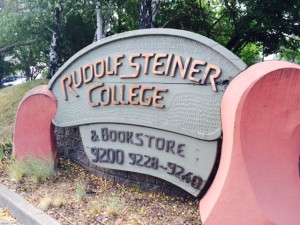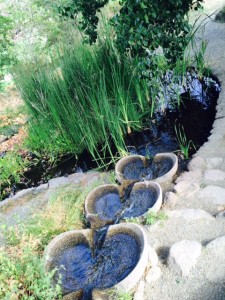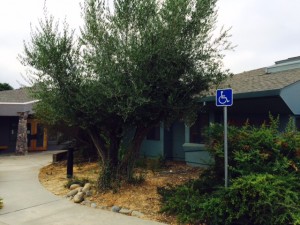By Peter Lawton, Fifth Grade Teacher
G reetings from Rudolf Steiner College in Sacramento, CA! I’m here doing my summer training, or what we Waldorf teachers affectionately call “Waldorf summer camp.” I’m sitting at a picnic table nestled under an olive tree in the RSC quad. There’s a group of what looks like early childhood teachers playing recorders under another tree. (How do I know they’re EC teachers? There’s a uniform. A hairstyle. Also, there’s not one man among them. You get a sense for these things over time.) I just passed through the exquisite school gardens, where a group of students were harvesting the reddest beets you’ve ever seen. (The gardening students have a different uniform. Dark Tan. Floppy hat. Bare feet.) Cows and sheep mull about. Chickens are cackling. I hear drumming coming from one of the classrooms, and I see some students sculpting clay through the windows of another classroom. Down at the Sacramento Waldorf School, which adjoins RSC along the beautiful American River, I know other groups of students are pouring over some of the foundational texts of Waldorf education, texts like The Foundations of Human Experience and Balance in Teaching, both by Rudolf Steiner. But what is this place? And why do so many teachers come here in the summer?
reetings from Rudolf Steiner College in Sacramento, CA! I’m here doing my summer training, or what we Waldorf teachers affectionately call “Waldorf summer camp.” I’m sitting at a picnic table nestled under an olive tree in the RSC quad. There’s a group of what looks like early childhood teachers playing recorders under another tree. (How do I know they’re EC teachers? There’s a uniform. A hairstyle. Also, there’s not one man among them. You get a sense for these things over time.) I just passed through the exquisite school gardens, where a group of students were harvesting the reddest beets you’ve ever seen. (The gardening students have a different uniform. Dark Tan. Floppy hat. Bare feet.) Cows and sheep mull about. Chickens are cackling. I hear drumming coming from one of the classrooms, and I see some students sculpting clay through the windows of another classroom. Down at the Sacramento Waldorf School, which adjoins RSC along the beautiful American River, I know other groups of students are pouring over some of the foundational texts of Waldorf education, texts like The Foundations of Human Experience and Balance in Teaching, both by Rudolf Steiner. But what is this place? And why do so many teachers come here in the summer?
 You’re familiar with Waldorf early childhood and elementary programs. You may also be aware that many areas are blessed with Waldorf high schools. But did you know there are also Waldorf colleges and adult training centers? Anthroposophical colleges to be precise. Anthroposophy is like the mother philosophy from which Waldorf education springs. (Anthropology is a scientific study of the human being; Anthroposophy is a scientific + artistic + intuitive study of the human being.) The anthroposophical picture of the human being not only forms and informs Waldorf education, but many other so-called anthroposophical initiatives such as anthroposophical medicine, biodynamic gardening and the Camphill movement. Many of the anthroposophical colleges do focus on Waldorf education because of its popularity and the need to train Waldorf teachers, but colleges offer other focuses as well. For instance, Rudolf Steiner College is renowned for its biodynamic gardening program. Some colleges focus more on formal training programs, while some focus more on personal development and social renewal. Some colleges, like RSC, even offer degree programs, often in conjunction with more traditional institutions of higher learning. At RSC you can get an MA in Waldorf education!
You’re familiar with Waldorf early childhood and elementary programs. You may also be aware that many areas are blessed with Waldorf high schools. But did you know there are also Waldorf colleges and adult training centers? Anthroposophical colleges to be precise. Anthroposophy is like the mother philosophy from which Waldorf education springs. (Anthropology is a scientific study of the human being; Anthroposophy is a scientific + artistic + intuitive study of the human being.) The anthroposophical picture of the human being not only forms and informs Waldorf education, but many other so-called anthroposophical initiatives such as anthroposophical medicine, biodynamic gardening and the Camphill movement. Many of the anthroposophical colleges do focus on Waldorf education because of its popularity and the need to train Waldorf teachers, but colleges offer other focuses as well. For instance, Rudolf Steiner College is renowned for its biodynamic gardening program. Some colleges focus more on formal training programs, while some focus more on personal development and social renewal. Some colleges, like RSC, even offer degree programs, often in conjunction with more traditional institutions of higher learning. At RSC you can get an MA in Waldorf education!
Most of the people I see around me are teachers, but some are parents interested in Waldorf education on a deeper level. Many of the teachers are here for weeks–even months–in the summer, working on their Waldorf teacher training certificates (the Waldorf equivalent of licensure). Some, like me, finished their certificate programs long ago and are here for a bit of re-invigoration, for a glorified pep-talk. As you probably know, Waldorf elementary teachers loop with their classes for eight years. That’s a completely new curriculum and developmentally appropriate pedagogy every year! Many colleges and summer institutes like Rudolf Steiner College offer summer enhancement programs to help elementary teachers prepare for the next grade level. Think of it as one part curricular resources, one part developmental profile, and one part inspiration, with a little review of methodology thrown in for good measure. RSC calls these courses The Art of Teaching Grade __ (grade 5 in my case). I don’t see as many early childhood and high school teachers at these summer brush-ups after they’ve received their teaching certificates because their curriculum and the developmental profile of their students remains relatively stable compared to that of the elementary teacher. But I do see early childhood and high school teachers (as well as elementary teachers) participating in renewal and enhancement programs focusing on topics like science or music, or pursuing additional certificates in programs involving movement or remedial work.
The Waldorf teacher training certificate (our equivalent to state licensure) is comparable to a two-year graduate program. Some teachers take the training program full-time, but many do it over the course of several summers with additional weeks or weekends thrown in throughout the year. The first year of the teacher training is often called the foundational year. This first year is devoted to the study of the anthroposophical picture (philosophy, cosmology) of the human being. What does this mean exactly, the anthroposophical picture of the human? Well, it’s an attempt to answer questions like, what does it mean that humans are spiritual beings? Or what does it mean, a holistic approach to learning? Or—we can see how a child develops with our own eyes, but–why does development follow a particular pattern, what underlies this pattern? For Waldorf teachers, the answers to these questions are informed by Rudolf Steiner’s understanding of the human being, which at its heart is the picture of the union of material and spiritual forces. As Waldorf educators, the way we understand the human being must directly inform teaching and learning in the Waldorf school. One thing I can say about Waldorf education without hesitation or fear of religiosity is, in no other educational program does philosophy so align with methodology. Everything we do in the Waldorf school—unless we do it poorly—must make sense in terms of what we believe it means to be a human being, a human being of body, soul, and spirit.
 While the first year is foundational, the second year of the teacher training certificate program is largely devoted to teaching and learning. This includes a focus on child development, as well as the curriculums (the what) and pedagogies (the how) that educate the child in their various stages of development. Teachers take courses in child development as a whole, as well as specific courses in music, history, math, fine arts, science, and so on and so on. Educators may pursue teaching certificates in early childhood, elementary, or high school levels, or in special subjects such as music, world languages, or handwork. Certificates are also offered in administration or development.
While the first year is foundational, the second year of the teacher training certificate program is largely devoted to teaching and learning. This includes a focus on child development, as well as the curriculums (the what) and pedagogies (the how) that educate the child in their various stages of development. Teachers take courses in child development as a whole, as well as specific courses in music, history, math, fine arts, science, and so on and so on. Educators may pursue teaching certificates in early childhood, elementary, or high school levels, or in special subjects such as music, world languages, or handwork. Certificates are also offered in administration or development.
In Waldorf parlance, the type of course I’m taking this week—The Art of Teaching Grade 5—is a grade-level intensive course. Grade level intensives help elementary teachers prepare for the next school year in the curricular sense, but they also hopefully inspire teachers to meet their ever-changing, ever-growing students in a fresh way. I haven’t participated in this type of course every summer of my teaching career, but I find them incredibly valuable. I’ve attended grade-level intensives in New York, Philadelphia, Toronto, Durango, CO, and many here in Sacramento. Some programs are smaller, with one or two main faculty presenting, while Rudolf Steiner College has a fairly large, well-established program with multiple faculty members. I have no fewer than ten teachers this week, presenting in subjects as varied as speech, music, history, math, movement (pentathlon), the inner work of the teacher, assessment, planning, and the most esoteric of subjects–working with colleagues! One of the most valuable aspects of the training is meeting and connecting with Waldorf teachers from all around the US, as well as Canada and Mexico. It’s good to mingle with experienced teachers as well as those just entering their first year of teaching. Teachers trade resources as well as war stories.
 Many of the anthroposophical colleges such as RSC are in bucolic locales, established years ago in the choicest areas before being engulfed by urban sprawl. RSC shares the bluffs along the American River with the Sacramento Waldorf School (16K per year). (Two other City of Lakes teachers and I went rafting down the American this past weekend!) Sunbridge College in New York shares a campus with The Green Meadow Waldorf School (24K per year!) and several other Waldorf initiatives; bridges crossing meandering streams, and paths through the woods, connect the various college buildings and dorms. Despite the intense schedule of classes (8 a.m. to 9 p.m., Monday through Friday), the summer intensives often offer the chance for re-invigoration and renewal in a beautiful setting.
Many of the anthroposophical colleges such as RSC are in bucolic locales, established years ago in the choicest areas before being engulfed by urban sprawl. RSC shares the bluffs along the American River with the Sacramento Waldorf School (16K per year). (Two other City of Lakes teachers and I went rafting down the American this past weekend!) Sunbridge College in New York shares a campus with The Green Meadow Waldorf School (24K per year!) and several other Waldorf initiatives; bridges crossing meandering streams, and paths through the woods, connect the various college buildings and dorms. Despite the intense schedule of classes (8 a.m. to 9 p.m., Monday through Friday), the summer intensives often offer the chance for re-invigoration and renewal in a beautiful setting.
So, greetings. Wish you were here. I hope you all have the opportunity for some manner of renewal this summer. Rudolf Steiner gives the beautiful picture of the earth sleeping in the summer; the flowers are the earth’s dreams made visible! Summer is a time for humans to blossom as well, though we don’t flower (reproductive analogies aside). Our blossoming is in our limbs, in our activity. The activity-pollen we collect re-invigorates our work and our thinking, and hopefully sustains us through the darker, colder months to come. I hope your summer activities reconnect you with your family and friends and nature as well. I just wanted to take this opportunity to thank you, the parent body, for supporting this professional development work through your tuition and your charitable donations. Many Waldorf schools support professional development financially at least in part. City of Lakes has traditionally been very generous in its support. Although it’s only a small portion of our overall budget, the money spent on the professional development of teachers makes a huge, positive difference in the overall educational program of our school.
 Waldorf education is exploding. Here in Sacramento, there are many Waldorf-inspired charter schools as well as several fully public Waldorf schools (another article perhaps). There are not enough trained Waldorf teachers to fill the needs of the movement. It behooves non-Hawaiian, non-coastal schools like ours–in the post glacial, bug-infested climbs of Up North—to train our own. And these opportunities for renewal in the summer bring new and sustaining life-blood to the school each fall, and promote healthy institutional growth into the future. Summer greetings from Camp Waldorf, 2015!
Waldorf education is exploding. Here in Sacramento, there are many Waldorf-inspired charter schools as well as several fully public Waldorf schools (another article perhaps). There are not enough trained Waldorf teachers to fill the needs of the movement. It behooves non-Hawaiian, non-coastal schools like ours–in the post glacial, bug-infested climbs of Up North—to train our own. And these opportunities for renewal in the summer bring new and sustaining life-blood to the school each fall, and promote healthy institutional growth into the future. Summer greetings from Camp Waldorf, 2015!


